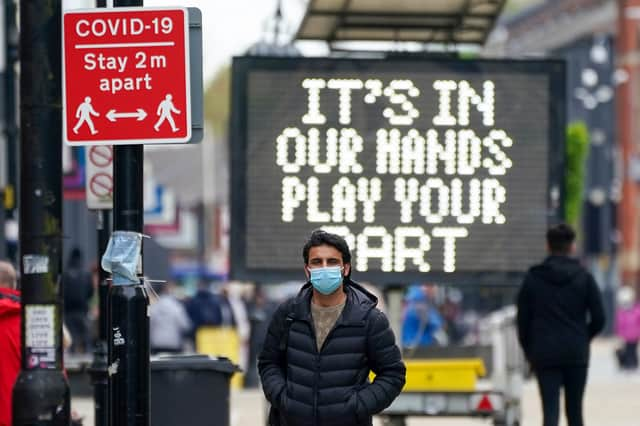Ministers warn some lockdown measures may still be needed after 21 June


Blackburn with Darwen has overtaken Bolton to become the area of the UK with the highest rate of new Covid-19 cases.
The rising rates has been driven by the continued spread of the Indian coronavirus variant, with ministers now warning some lockdown measures may need to remain in place after 21 June - the planned date for ending all legal social restrictions in England.
Advertisement
Hide AdAdvertisement
Hide AdHigh Covid case rates
A total of 584 Covid-19 cases were recorded in Blackburn with Darwen, in Lancashire, in the seven days to 26 May, according to latest figures from Public Health England (PHE).
This is the equivalent of 390.1 cases per 100,000 people, and the highest seven-day rate for the area since the start of February.
By comparison, the seven-day rate in Bolton, in Greater Manchester, is currently 386.7 cases per 100,000 people, down from 452.8 on 21 May.
The fall in rates in Bolton suggests that the recent surge in cases, largely driven by the spread of the Indian variant, may now have peaked.
Advertisement
Hide AdAdvertisement
Hide AdThe two areas, which share a border, have both reported some of the highest numbers of the Indian variant, with Bolton recording 1,354 cases up to 25 May - the highest in the country.
Surge testing has been rolled out in both local authorities in an effort to control the spread, alongside “surge vaccinations” to boost uptake among those who are eligible for the vaccine to try and drive case numbers down.
The borough of Rossendale, also in Lancashire, is now recording the third highest rate of new Covid-19 cases in the UK, with 292.4 cases per 100,000 people. This is a significant increase from just 63.0 cases per 100,000 in the week previous.
Overall, 230 of the 380 local areas in the UK (61 per cent) recorded a week-on-week increase in Covid-19 case rates as of 26 May, while 130 (34 per cent) recorded a fall and 20 (5 per cent) remained unchanged.
Advertisement
Hide AdAdvertisement
Hide AdData for the most recent four days, from 27 to 30 May, has been excluded as it is incomplete and does not reflect the true number of cases.
Will 21 June unlocking go ahead?
Ministers have said they will adopt a cautious approach in deciding whether it is safe to go ahead with easing lockdown in England on 21 June as planned, with hospitals already under pressure and health experts warning against “charging ahead”.
It is thought that some measures may be kept in place beyond 21 June to help minimise the risk of further outbreaks, such as the continued use of face masks and guidance on working from home.
The government will wait for the latest data on 14 June before deciding whether to proceed with the lifting of restrictions the following week.
Advertisement
Hide AdAdvertisement
Hide AdVaccines minister Nadhim Zahawi said “we have to be cautious” due to concerns over rising infection rates, and said it will not be clear what measures will be safe to lift until more data is available over the next few weeks.
Asked whether the remaining restrictions could be eased if cases were still increasing, he told BBC1’s Andrew Marr Show: “What I’m saying to you is we have to be cautious. We have to look at the data and share it with the country.
“Are we still vaccinating at scale? Big tick. Are the vaccines working? Yes.
“But are infection rates too high for us to then not be able to proceed because there are too many people getting into hospital? I don’t know the answer to it.
Advertisement
Hide AdAdvertisement
Hide Ad“But we will know it on, hopefully on the 14th, a few more weeks.”
Mr Zahawi added that the vaccine programme aimed to offer a second dose to all over-50s by 21 June, but he told Times Radio “I could do with more supply” because “I will be able to protect more people more rapidly”.